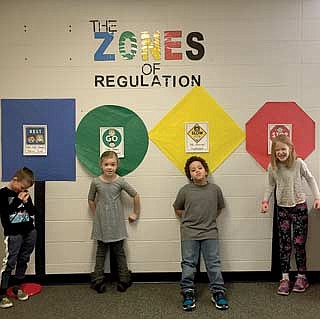January 25, 2019 at 4:15 p.m.
Increasing student engagement through self-regulation at Pelican Elementary School
By Cere Yeager-
We have adopted the Zones of Regulation, a curriculum that teaches students healthy strategies for self-regulation and emotional control. We know that when kids are experiencing stress, it is difficult for them to learn and engage in the classroom, so it makes sense to teach children strategies to deal with difficult emotional states they may be experiencing. We would like to describe how we are implementing this program at Pelican School.
Pelican staff began learning about the Zones of Regulation in the spring of 2018. When students came back to school in the fall, we were excited to begin this new program with them.
The zones themselves are four levels of alertness, each encompassing different emotions. The Blue Zone refers to a low state of alertness. A person in the Blue Zone might be feeling tired, sad, sick, or bored. The Green Zone is considered an ideal state of alertness. Green Zone feelings can include happiness, calm, focused, or ready to learn. The Yellow Zone describes a heightened state of alertness. A person in the Yellow Zone might be feeling stress, frustration, anxiety, excitement, silliness, nervous, overwhelmed, confused, embarrassed, or afraid. The Red Zone refers to an extremely heightened level of alertness. Someone in the Red Zone might be experiencing rage, terror, explosive behavior, panic, extreme grief, or even elation.
It is very important to keep in mind that no zone is a bad zone. Everyone - adults included - experiences all the zones at various times. The Zones of Regulation program is meant to be a non-judgmental way of teaching students to recognize emotions and states of being in themselves and others so that they can develop their self-regulation skills and learn strategies to help them manage their feelings in a healthy way. Self-regulation is something everyone continues to work on within themselves, whether consciously aware of it or not. Developing an ability to self-regulate not only helps students to be engaged and do their best learning at school, but also helps them manage stress, gain independence, and nurture healthy relationships with friends and family.
Students are taught a variety of tools or strategies to use to help them regulate when they are in different zones. These tools are practiced when students are in the Green Zone, so that they can comfortably rely on them at a time when they might be feeling too escalated to effectively try a strategy for the first time.
Examples of tools that students learn about are deep breathing, having something to fidget with, and thinking strategies such as recognizing the size of the problem. Students are taught to match tools with zones. Perhaps when they are tired - in the Blue Zone - they find that taking a movement break and doing some jumping jacks helps to increase their energy level. When a child is in the Yellow Zone, they might use deep breathing as a tool to help themselves calm down.
We have heard positive feedback and seen great gains with our students since starting the Zones of Regulation. Each classroom has a Zones Check-In as part of their morning routine, where students communicate what zone they are in at the start of the day; sometimes changing zones throughout the day as their state of mind changes. This is an excellent way for teachers and staff to get a sense of what the class as a whole might need, whether it's a movement break to get their energy level up or a brief meditation to get their brains calm and focused; or which child might benefit from some extra attention before beginning the daily routine. Zones of Regulation is not a discipline model and it is not a replacement for PBIS (Positive Behavior Interventions and Supports), which we are still using successfully at school. Rather, it is another piece of our continual efforts to build and maintain a positive school culture. We hope it will help our young students build a foundation for self-control, resilience and empathy that will benefit them throughout their lives.


Comments:
You must login to comment.